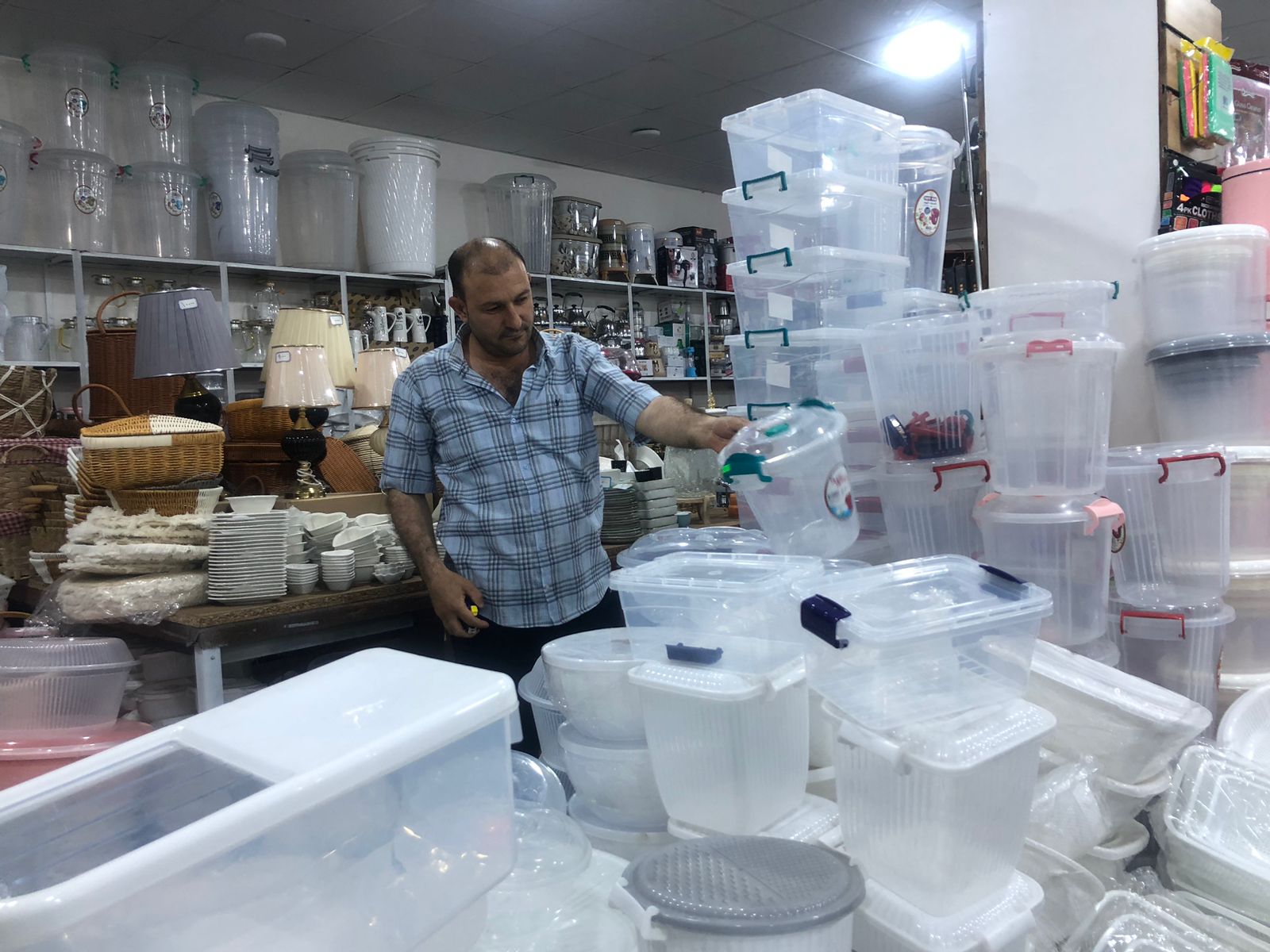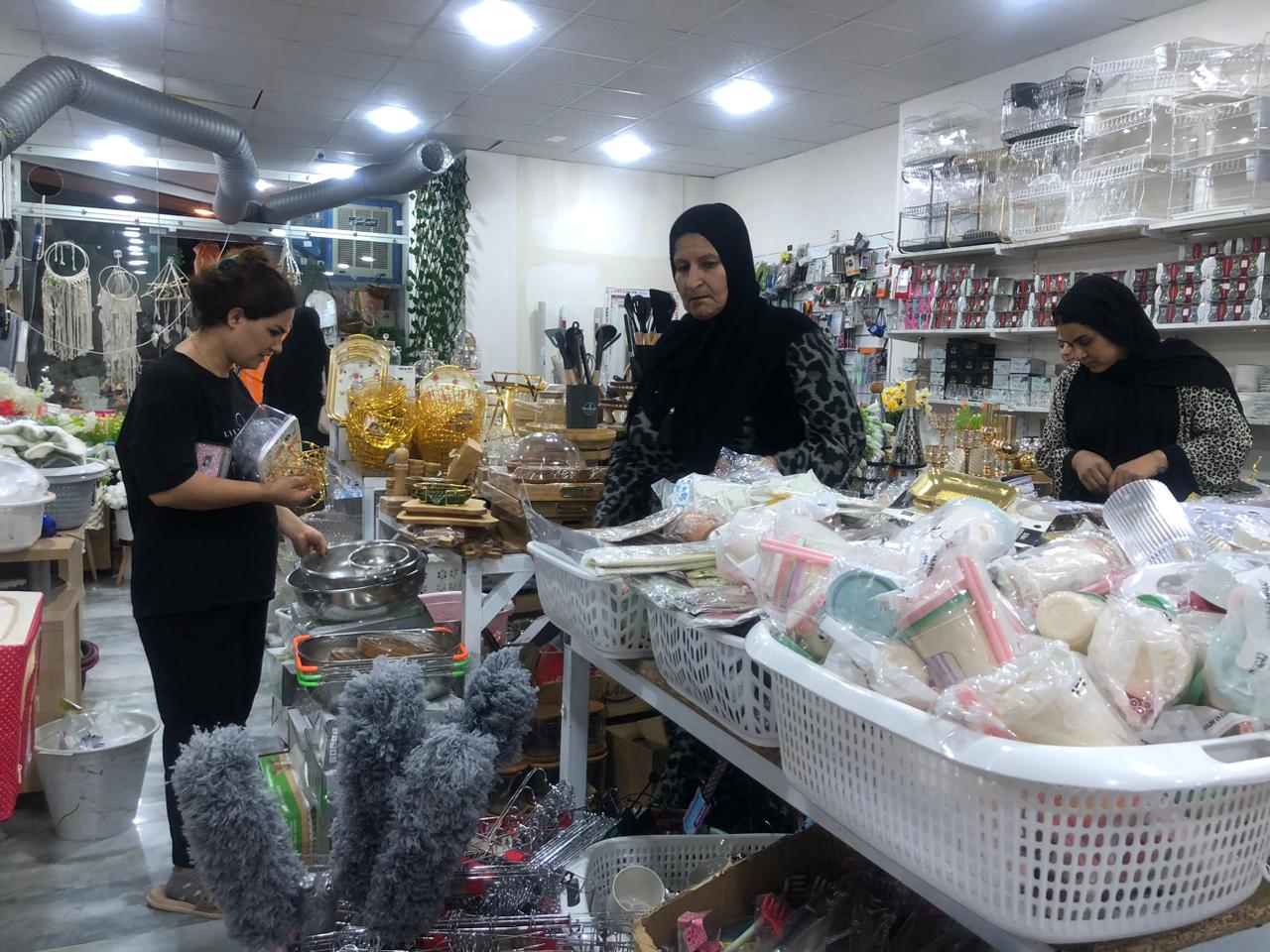Families now use plastic table covers and dispose of them after single use, a sight that Shilan Ali (53 years old) was not accustomed to in Iraq before immigrating to Europe.
When Shilan moved from Sulaymaniyah 37 years ago, specifically in 1997, to settle in the Netherlands, the family used to clean the dining table cover after meals and reuse it for the next one.
The scene has now changed, with homes filled with numerous nylon and plastic items that are discarded after a single use, becoming a significant environmental pollutant.
Cups, spoons, knives, and plastic utensils are all thrown away after one use, contributing to a rise in waste production that poses a threat to the environment.
According to the latest statistics from the Central Statistical Organization in Iraq, waste production per capita in Iraq in 2022 exceeded 2.5 kilograms per day, totaling 11.9 million tons for the year. However, there are no specific figures on the percentage of nylon and plastic within this waste.
Shilan, a resident of Amsterdam, recalls buying a plastic dining table during a visit to Iraq and bringing it back to the Netherlands. She began using it like other Iraqi families without considering the environmental damage it causes. "Plastic table covers are available in the Netherlands, but they are hard to find and expensive."
Plastic table covers are available in the Netherlands, but they are hard to find and expensive
The ease of access, affordability, and convenience make plastic dining tables, cups, and utensils a popular choice for Iraqi families. This trend has turned the production of these items into a profitable business for some.
Rawz Omed, a young man, runs a store selling plastic household items in the northern province of Sulaymaniyah.

"The best-selling item here is the plastic table covers. There is a consistent demand for it, with some days seeing up to 20 rolls. Occasionally, a customer might request a dining table that can be cleaned and reused."
In addition to the low production costs and imports, many local factories manufacture nylon dining table covers and other items, making them accessible to everyone at affordable prices.
The price of a 400-gram plastic cover roll in Germany is 3.5 euros, equivalent to 6,000 Iraqi dinars IQD (USD). In Iraq, the price of a 1500-gram low-quality roll is 1500 IQD, while a high-quality one is 2500 IQD.
The price of 50 nylon cups in Iraq is 1,000 IQD, while the same is sold in Germany for three euros, equivalent to 5,000 IQD, according to KirkukNow’s follow-ups. Additionally, the price of 10 plastic knives in Iraq is 1,000 IQD for 2.3 Euros in Germany, their price is 2 euros and 29 cents, 4,500 IQD.
Sara Salam, a woman living in Halabja, used to use plastic tablecloths and cups until three years ago. “I had three children and I was working as a teacher. Using items made of nylon and plastic is inexpensive and convenient,” Sara added.
“Then I learned about the extent of the damage these items cause to the environment because they do not decompose in the soil, so I stopped using them completely. Today I use a dining table that can be reused after cleaning.”
Today I use a dining table that can be reused after cleaning
Sara's awakening did not reach the level of community awareness. A large part of the plastic waste in Iraq is burned, leading to a direct relationship between air pollution and plastic waste. According to IQ Air, a Swiss company working in air quality technology, Iraq’s air is among the “most polluted” in the world.
The Plastic Oceans International, dedicated to end global plastic pollution by informing communities, reports that more than 380 million tons of plastic are produced annually worldwide, with 50% being suitable for single-use only.
In April 2021, the Kurdistan Nature Organization, a local environmental NGO, submitted a draft law to the Iraqi Kurdistan Regional Parliament to impose restrictions on the use of nylon and plastic. However, the project was not included on the parliament’s agenda before the extension of the regional parliament’s term which was suspended by a decision of the Iraqi Federal Court.
Under the draft law, legal means were proposed ensure restricting the use of plastic, 100% tax on imported plastic and 75% on local plastic production.
“We are waiting for the elections and the new parliament to start its duties. We will submit the draft law to parliament with the same enthusiasm and determination,” said Sirur Qardaghi, the head of the Kurdistan Nature Organization,
Mustafa Juma, spokesman for the Sulaymaniyah Environment Department, stated, "We cannot currently ban the use of plastic materials because we do not have alternatives."
This comes while the department itself banned the use of plastic materials within the department in 2020.
According to the OECD iLibrary humans produce more than 350 million tons of plastic waste annually, with expectations to reach one billion tons by 2060 if this trend continues.
The platform that publishes books and researches for academics, part of the Organisation for Economic Co-operation and Development (OECD) an international organisation that works to build better policies for better lives,
Muhammad Farouk, Quality Control Officer at Razgga Company, emphasized the importance of examining all plastic materials entering Iraq via the Bashmakh crossing, Sulaimaniyah, on the border with Iran, especially for heavy metals such as lead.
He mentioned that plastic is imported continuously, but due to the installation of local factories, imports have declined.
Sara, 45, reached for a plastic plate she bought for her home three years ago and said, “I wanted to use it, it can be reused many times, but when I learned about the harm plastic causes to the environment I didn’t dare to use it.”
The question is: does everyone share Sara's fear?
This material was produced as part of the program to expand the role of women in covering environmental issues, implemented by the KirkukNow Media Outlet with the support and funding of the Federal Foreign Office of the Federal Republic of Germany.





